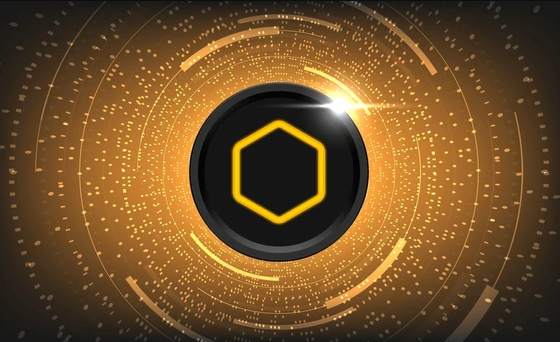-
 Bitcoin
Bitcoin $103,364.7267
-0.55% -
 Ethereum
Ethereum $2,588.3679
0.05% -
 Tether USDt
Tether USDt $1.0001
0.00% -
 XRP
XRP $2.5499
-0.41% -
 BNB
BNB $651.4058
-1.47% -
 Solana
Solana $175.6659
-0.73% -
 USDC
USDC $0.9999
-0.02% -
 Dogecoin
Dogecoin $0.2313
-2.83% -
 Cardano
Cardano $0.8024
-2.06% -
 TRON
TRON $0.2757
2.40% -
 Sui
Sui $3.8829
-3.34% -
 Chainlink
Chainlink $16.8858
-1.34% -
 Avalanche
Avalanche $25.2572
-0.04% -
 Stellar
Stellar $0.3041
-2.64% -
 Shiba Inu
Shiba Inu $0.0...01574
-1.56% -
 Hedera
Hedera $0.2055
-3.96% -
 Hyperliquid
Hyperliquid $25.4946
0.21% -
 Toncoin
Toncoin $3.2634
-2.77% -
 UNUS SED LEO
UNUS SED LEO $8.7984
1.87% -
 Bitcoin Cash
Bitcoin Cash $404.1974
-0.58% -
 Polkadot
Polkadot $5.0046
-1.98% -
 Litecoin
Litecoin $99.5082
-2.34% -
 Pi
Pi $1.0389
-13.38% -
 Monero
Monero $347.3057
2.29% -
 Pepe
Pepe $0.0...01374
-3.89% -
 Bitget Token
Bitget Token $4.7217
-1.42% -
 Dai
Dai $0.9999
-0.02% -
 Ethena USDe
Ethena USDe $1.0006
0.00% -
 Uniswap
Uniswap $6.6246
-4.65% -
 Bittensor
Bittensor $448.0909
-2.16%
What can CORE coins be used for
CORE coins serve multiple purposes on the CORE blockchain platform, including transaction fees, mining rewards, purchases, and governance participation.
Nov 10, 2024 at 12:31 pm

What Can CORE Coins Be Used For?
CORE is a new blockchain platform that is designed to be scalable, secure, and efficient. It is powered by the CORE token, which is used to pay for transaction fees and to reward miners for their work. CORE coins can also be used to purchase goods and services on the CORE network.
Here are some of the specific uses of CORE coins:
- Transaction fees: CORE coins are used to pay for transaction fees on the CORE network. This helps to ensure that the network remains secure and efficient.
- Mining rewards: Miners are rewarded with CORE coins for their work in verifying and processing transactions on the CORE network. This helps to incentivize miners to keep the network running smoothly.
- Purchasing goods and services: CORE coins can be used to purchase goods and services on the CORE network. This includes a variety of items, such as digital goods, physical goods, and services.
- Governance: CORE coin holders can participate in the governance of the CORE network. This includes voting on proposed changes to the network and electing representatives to the CORE Foundation.
The following are some of the benefits of using CORE coins:
- Scalability: CORE is designed to be a scalable blockchain platform. This means that it can handle a large volume of transactions without becoming congested.
- Security: CORE is a secure blockchain platform. This means that it is resistant to hacking and other forms of attack.
- Efficiency: CORE is an efficient blockchain platform. This means that it is able to process transactions quickly and inexpensively.
- Versatility: CORE coins can be used for a variety of purposes, including paying for transaction fees, rewarding miners, purchasing goods and services, and participating in governance.
Overall, CORE coins are a valuable asset for the CORE network. They help to ensure that the network remains secure, efficient, and scalable. They can also be used to purchase goods and services on the CORE network and to participate in governance.
Disclaimer:info@kdj.com
The information provided is not trading advice. kdj.com does not assume any responsibility for any investments made based on the information provided in this article. Cryptocurrencies are highly volatile and it is highly recommended that you invest with caution after thorough research!
If you believe that the content used on this website infringes your copyright, please contact us immediately (info@kdj.com) and we will delete it promptly.
- Arctic Pablo Coin (APC) is the Next Big Meme Coin with Explosive Presale Potential
- 2025-05-15 00:25:13
- Bitcoin Solaris Enters Phase 3 of Its Public Token Presale, Prepares to Launch Nova App
- 2025-05-15 00:25:13
- XRP: Can the Momentum Continue Above Resistance?
- 2025-05-15 00:20:12
- The Sui blockchain SUI $3.65 2024-05-14
- 2025-05-15 00:20:12
- Tether Has Just Invested Nearly Half a Billion Dollars in Bitcoin to Launch a New Institutional Management Company
- 2025-05-15 00:15:13
- From Unlock to Utility: The Triggers Behind EIGENLayer Price Momentum
- 2025-05-15 00:15:13
Related knowledge

What is Ethereum’s Slashing mechanism and how to punish malicious behavior?
Feb 20,2025 at 03:08am
Key PointsOverview of slashingDifferent types of slashing in EthereumIncentives and consequences of slashingIdentifying and reporting slashed validatorsOngoing discussions and potential improvementsEthereum's Slashing Mechanism: Punishing Malicious BehaviorEthereum's slashing mechanism is an essential tool for ensuring network security and punishing mal...

What is the verifier node of Ethereum and how to become a verifier?
Feb 19,2025 at 06:00pm
The Verifier Node of Ethereum: A Comprehensive GuideKey Points:What is a Verifier Node?How to Become a Verifier NodeResponsibilities and Rewards of a Verifier NodeMinimum Requirements for Becoming a Verifier NodePotential Difficulties in Running a Verifier Node1. What is a Verifier Node?A Verifier Node is an independent entity on the Ethereum network th...

What is Ethereum’s staking, and how to participate and earn money?
Feb 19,2025 at 04:37pm
Key Points:Understanding Ethereum's Staking MechanismSteps to Participate in StakingBenefits and Rewards of StakingSecurity and Risk ConsiderationsTechnical Requirements and Hardware OptionsPotential Challenges and Troubleshooting TipsFAQs on Ethereum StakingWhat is Ethereum's Staking?Proof-of-Stake (PoS) is a consensus mechanism used in blockchain netw...

What is Ethereum’s DAO (Decentralized Autonomous Organization) and how does it work?
Feb 20,2025 at 03:12am
Key PointsDefinition and Structure of a DAOGovernance and Decision-Making in DAOsBenefits and Use Cases of DAOsChallenges and Limitations of DAOsWhat is Ethereum's DAO (Decentralized Autonomous Organization) and How Does It Work?Definition and Structure of a DAOA Decentralized Autonomous Organization (DAO) is an innovative governance and management fram...

What is Ethereum's multi-signature wallet and how to improve security?
Feb 20,2025 at 02:18pm
Key Points:Understanding the Concept of a Multi-Signature WalletBenefits and Drawbacks of Multisig WalletsRequirements for Setting Up a Multisig WalletStep-by-Step Guide to Generating a Multisig WalletImplementing Strategies for Enhanced Security1. Understanding the Concept of a Multi-Signature WalletA multi-signature (multisig) wallet in the Ethereum e...

What is Ethereum's oracle and how to provide data for smart contracts?
Feb 21,2025 at 01:30am
Key Points:Understanding the concept of oracles in EthereumExploring different types of oraclesDetailed guide on how to provide data for smart contractsAddressing potential challenges and considerationsWhat is Ethereum's Oracle?Oracles are crucial components in the Ethereum ecosystem, enabling smart contracts to access real-world data and off-chain even...

What is Ethereum’s Slashing mechanism and how to punish malicious behavior?
Feb 20,2025 at 03:08am
Key PointsOverview of slashingDifferent types of slashing in EthereumIncentives and consequences of slashingIdentifying and reporting slashed validatorsOngoing discussions and potential improvementsEthereum's Slashing Mechanism: Punishing Malicious BehaviorEthereum's slashing mechanism is an essential tool for ensuring network security and punishing mal...

What is the verifier node of Ethereum and how to become a verifier?
Feb 19,2025 at 06:00pm
The Verifier Node of Ethereum: A Comprehensive GuideKey Points:What is a Verifier Node?How to Become a Verifier NodeResponsibilities and Rewards of a Verifier NodeMinimum Requirements for Becoming a Verifier NodePotential Difficulties in Running a Verifier Node1. What is a Verifier Node?A Verifier Node is an independent entity on the Ethereum network th...

What is Ethereum’s staking, and how to participate and earn money?
Feb 19,2025 at 04:37pm
Key Points:Understanding Ethereum's Staking MechanismSteps to Participate in StakingBenefits and Rewards of StakingSecurity and Risk ConsiderationsTechnical Requirements and Hardware OptionsPotential Challenges and Troubleshooting TipsFAQs on Ethereum StakingWhat is Ethereum's Staking?Proof-of-Stake (PoS) is a consensus mechanism used in blockchain netw...

What is Ethereum’s DAO (Decentralized Autonomous Organization) and how does it work?
Feb 20,2025 at 03:12am
Key PointsDefinition and Structure of a DAOGovernance and Decision-Making in DAOsBenefits and Use Cases of DAOsChallenges and Limitations of DAOsWhat is Ethereum's DAO (Decentralized Autonomous Organization) and How Does It Work?Definition and Structure of a DAOA Decentralized Autonomous Organization (DAO) is an innovative governance and management fram...

What is Ethereum's multi-signature wallet and how to improve security?
Feb 20,2025 at 02:18pm
Key Points:Understanding the Concept of a Multi-Signature WalletBenefits and Drawbacks of Multisig WalletsRequirements for Setting Up a Multisig WalletStep-by-Step Guide to Generating a Multisig WalletImplementing Strategies for Enhanced Security1. Understanding the Concept of a Multi-Signature WalletA multi-signature (multisig) wallet in the Ethereum e...

What is Ethereum's oracle and how to provide data for smart contracts?
Feb 21,2025 at 01:30am
Key Points:Understanding the concept of oracles in EthereumExploring different types of oraclesDetailed guide on how to provide data for smart contractsAddressing potential challenges and considerationsWhat is Ethereum's Oracle?Oracles are crucial components in the Ethereum ecosystem, enabling smart contracts to access real-world data and off-chain even...
See all articles





















![[Market 5.13] BTC continues to play music and dance? #btc #ETH #sol #doge [Market 5.13] BTC continues to play music and dance? #btc #ETH #sol #doge](/uploads/2025/05/14/cryptocurrencies-news/videos/market-btc-continues-play-music-dance-btc-eth-sol-doge/image_500_375.webp)




![[Ronnie Trading Guide]-2025.5.14-Notice: Bitcoin will test the previous high soon~ wait and see~ [Ronnie Trading Guide]-2025.5.14-Notice: Bitcoin will test the previous high soon~ wait and see~](/uploads/2025/05/14/cryptocurrencies-news/videos/ronnie-trading-guidenotice-bitcoin-test-previous-wait/image_500_375.webp)





























































